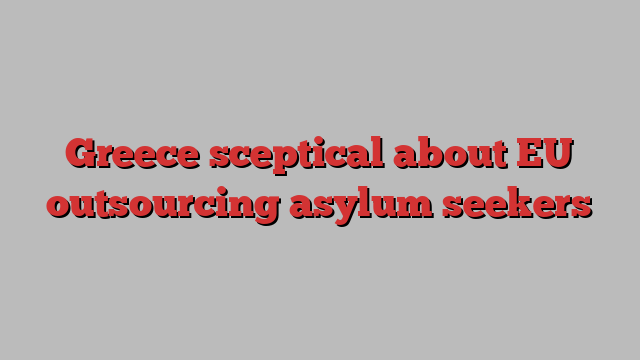
Unlock the Editor’s Digest for free
Roula Khalaf, Editor of the FT, selects her favourite stories in this weekly newsletter.
Greek Prime Minister Kyriakos Mitsotakis has cautioned against proposals to outsource EU asylum policy to countries outside the bloc at the outset of a leaders’ summit in Brussels where migration is set to dominate the discussions.
Several centrist leaders in Europe have veered right on the issue in recent months, including German Chancellor Olaf Scholz and Poland’s Prime Minister Donald Tusk, with the European Commission now signalling openness to so-called innovative solutions, including return hubs for migrants set up outside the EU. Italy this week began a pilot system involving processing migrants in a centre in Albania.
But in an interview with the Financial Times on Thursday, Mitsotakis expressed scepticism about calls to roll out the Italy-Albania model across the EU as a whole.
“Let me be careful here. This is a bilateral arrangement. I don’t know whether it could be replicated at the European level,” he said. “We also have to see if it actually works.
“These people are processed according to Italian asylum legislation, and whatever happens to them, they will in one way or another, be returned to Italy. If we were to do so at the European level . . . where would they go?”
He called for the EU to increase legal migration in parallel with efforts to clamp down on irregular entries, as there was a critical need for skilled and unskilled workers in Europe’s economy.
“If you want to build a big fence, you also need a big door,” Mitsotakis said, underscoring Greece’s labour shortage. “Who is going to pick our olives? We are a continent that is shrinking, and we all recognise that in order to maintain our productivity, we will need labour, unskilled or skilled.”
As the south-eastern gateway to the EU, Greece has historically been on the frontline of migration and has been criticised by human rights groups for mistreating seaborne people seeking asylum.
Mitsotakis said Greece had saved “thousands of people at sea” but stressed that “we will make it difficult for people to enter”.
The Greek leader, who has been in power since 2019 and is a political ally of European Commission president Ursula von der Leyen, called on Brussels to redouble efforts to increase the number of failed migrants being deported, which currently stands at 20 per cent.
“There are people whose asylum applications are rejected . . . and what to do with those has never been a topic of discussion,” Mitsotakis said, highlighting a key gap in the bloc’s migration framework. “Some of the ideas that have been suggested seem interesting to me. But I think we are still at the early stages of coming up with a concrete proposal.”
Mitsotakis joined 11 other EU leaders including von der Leyen ahead of the summit on Thursday morning where they discussed voluntary repatriations and “return hubs”, an EU diplomat said.
Last week, Poland’s Tusk said he would temporarily suspend the right to asylum for people coming into the country through Belarus, citing attempts by Minsk and its ally Moscow to destabilise Poland.
His move came after Finland this year closed its border with Russia, with Finnish premier Petteri Orpo on Thursday calling on other countries to also build fences to protect the bloc’s external border. He urged the EU to adopt new legislation to counter “instrumentalised migration” from Russia and Belarus.
Germany has also implemented border controls on all of its frontiers, leading to concerns about the future of Europe’s borderless Schengen area.
While the German rightwing opposition is pushing for Berlin to outsource asylum the way Italy has, Scholz on Thursday said: “Concepts that only represent very few, little drops, if you look at the numbers, are not really the solution for such a big country as Germany,” in an apparent reference to the fact that only 16 men have so far been sent from Italy to Albania.
Additional reporting by Alice Hancock, Paola Tamma in Brussels and Guy Chazan in Berlin